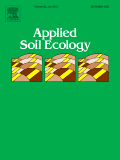
APPLIED SOIL ECOLOGY
Scope & Guideline
Illuminating the Role of Soils in Ecosystem Services
Introduction
Aims and Scopes
- Soil Microbial Ecology:
Research on the diversity, composition, and functions of soil microbial communities, including their influence on nutrient cycling, soil health, and plant interactions. - Soil Management Practices:
Studies examining the effects of various agricultural practices (e.g., organic amendments, crop rotation, cover cropping) on soil properties, microbial communities, and ecosystem functions. - Bioremediation and Pollution Management:
Investigation into the use of soil microorganisms and amendments (like biochar and compost) to remediate contaminated soils and enhance soil health. - Plant-Soil Interactions:
Explorations of how plant growth and health are influenced by soil biota, including mycorrhizal associations and other beneficial microorganisms. - Ecosystem Services and Soil Health:
Research focusing on the role of soil organisms in providing ecosystem services, including carbon sequestration, nutrient cycling, and soil structure maintenance. - Impact of Climate Change:
Studies assessing how changes in climate variables (e.g., temperature, precipitation) affect soil microbial communities and their functional capacities.
Trending and Emerging
- Microplastics in Soil Systems:
An increasing focus on the effects of microplastics on soil ecology, including their impact on microbial communities and soil health, reflects a growing recognition of pollution issues. - Soil Health Assessment Tools:
Emerging methodologies for evaluating soil health are gaining attention, with research focusing on developing indices and metrics that incorporate biological, chemical, and physical soil properties. - Climate Resilience and Soil Management:
Research is trending towards understanding how soil management practices can enhance resilience to climate change, particularly in agricultural systems. - Soil-Borne Pathogen Management:
There is a rising interest in biological control methods and the role of soil microbiomes in suppressing soil-borne diseases, which is crucial for sustainable agriculture. - Ecosystem Services Valuation:
Studies that assess the contribution of soil organisms to ecosystem services, such as carbon storage and nutrient cycling, are gaining prominence, highlighting their importance in land management. - Integrated Nutrient Management Strategies:
There is a trend towards research that combines organic and inorganic approaches to improve soil health and crop productivity, rather than focusing solely on conventional methods.
Declining or Waning
- Invasive Species Impact Studies:
Research on the effects of invasive species on soil communities has decreased, possibly due to a shift towards more applied ecological practices and management strategies. - Traditional Fertilization Practices:
There is a waning interest in studies solely focused on chemical fertilization effects, as the field moves towards integrated nutrient management approaches that consider organic amendments and sustainable practices. - Soil Salinity and Alkalinity Effects:
Research specifically addressing the impacts of salinity on soil microbiomes is declining, possibly due to broader studies encompassing multiple stressors affecting soil health. - Soil Enzyme Activity Alone:
While enzyme activity studies are still relevant, there appears to be less emphasis on enzyme activity as a standalone measure of soil health, with more integrative approaches being preferred.
Similar Journals
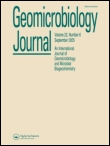
GEOMICROBIOLOGY JOURNAL
Exploring the Interplay of Microbes and EarthGEOMICROBIOLOGY JOURNAL, published by Taylor & Francis Inc, is a premier academic journal dedicated to the interdisciplinary field of geomicrobiology. With its ISSN 0149-0451 and E-ISSN 1521-0529, this journal serves as a vital platform for researchers, professionals, and students to share and advance knowledge regarding the complex interactions between geological and microbiological processes. Established in 1978, the journal has evolved through various phases and continues to publish valuable research that spans crucial topics in Earth and Planetary Sciences, Environmental Chemistry, and Microbiology. As reflected in its Scopus rankings, GEOMICROBIOLOGY JOURNAL is recognized for its significance within its field, achieving a Q2 quartile in areas like Earth and Planetary Sciences and Environmental Science. Despite not being an Open Access journal, it offers access options through institutional subscriptions, ensuring that its impactful research is available to a broad academic audience. Overall, GEOMICROBIOLOGY JOURNAL remains an essential resource for those dedicated to exploring the intersection of microbial life and geological processes, fostering innovation and collaboration across disciplines.
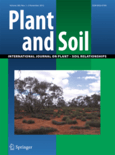
PLANT AND SOIL
Innovating research to enhance crop productivity and ecosystem balance.PLANT AND SOIL is a prestigious academic journal that has been at the forefront of plant and soil research since its inception in 1948. Published by SPRINGER in the Netherlands, this journal has carved a niche as a leading source of high-quality, peer-reviewed articles, which are essential for researchers, professionals, and students in the fields of Plant Science and Soil Science. With an impressive impact factor placing it in the Q1 category of both disciplines, it ranks 50th in the field of Plant Science and 24th in Soil Science, highlighting its influence in the scientific community. Although not available as open access, the journal provides a wealth of knowledge and insights into the interactions between plants and soils, exploring critical topics such as soil health, crop productivity, and sustainable agriculture practices. Researchers who wish to contribute to this vital area of study through their empirical findings will find PLANT AND SOIL to be an invaluable platform for disseminating their work and connecting with a network of leading scholars committed to advancing our understanding of these essential ecosystems.

Soil Ecology Letters
Cultivating Knowledge for Ecological ResilienceSoil Ecology Letters, published by SpringerNature, is a premier journal dedicated to advancing the knowledge and understanding of soil ecosystems, their functions, and their vital role in global sustainability. Since its inception in 2019, this leading journal has consistently maintained its prestigious Q1 ranking in Ecology, Evolution, Behavior and Systematics, as well as Soil Science, reflecting its significant impact in the ecological and environmental sciences community. With an impressive Scopus ranking that places it within the top percentile of journals in its field, Soil Ecology Letters provides a platform for researchers and professionals to disseminate their groundbreaking findings. The journal is a vital resource for advancing research in agricultural and biological sciences, offering open access options that promote widespread dissemination of knowledge. With its focus on fostering collaboration and innovation in soil ecology, this journal is essential reading for anyone aiming to deepen their understanding of soil environments and their critical role in ecological health.
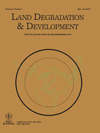
LAND DEGRADATION & DEVELOPMENT
Transforming knowledge into action for environmental stewardship.LAND DEGRADATION & DEVELOPMENT is a premier academic journal published by WILEY that has been at the forefront of research on the critical issues surrounding land degradation since its inception in 1989. With an impressive impact factor and ranked in the Q1 category across multiple fields including Development, Environmental Chemistry, Environmental Science, and Soil Science, this journal serves as an essential resource for scholars and professionals dedicated to sustainable land management and environmental conservation. Although it currently does not provide open access, its rigorous peer-review process ensures the publication of high-quality, impactful research that addresses vital environmental challenges. The journal aims to foster interdisciplinary collaboration, promote innovative solutions, and disseminate knowledge that not only informs policy but also empowers communities to combat land degradation effectively. Researchers, professionals, and students alike will find the insights and findings published in LAND DEGRADATION & DEVELOPMENT invaluable for advancing their understanding and practices within this critical field.
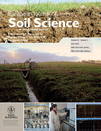
EUROPEAN JOURNAL OF SOIL SCIENCE
Leading the Way in Soil Science Research and InnovationEUROPEAN JOURNAL OF SOIL SCIENCE, published by Wiley, stands as a leading platform in the field of soil science, recognized for its contributions to the understanding of soil ecology, management, and sustainability. With an impressive impact factor and a distinguished Q1 ranking in Soil Science, this journal has recently ranked 23rd out of 159 in its category on Scopus, placing it in the 85th percentile among its peers. Covering a wide array of topics as it converges into the future, from 1994 to 2024, the journal aims to disseminate groundbreaking research and innovative methodologies that address the pressing challenges of soil degradation and environmental sustainability in Europe and beyond. Although it is not an open access journal, the EUROPEAN JOURNAL OF SOIL SCIENCE remains a vital resource for researchers, professionals, and students seeking to deepen their understanding and explore the latest advancements in soil science.

PLANT SOIL AND ENVIRONMENT
Innovating Agricultural Solutions Through Interdisciplinary Research.PLANT SOIL AND ENVIRONMENT is a premier open-access journal dedicated to the interdisciplinary study of soil science, agronomy, and environmental interactions, published by the Czech Academy Agricultural Sciences. With an ISSN of 1214-1178 and E-ISSN 1805-9368, this journal has been a vital platform for dissemination of research since its inception in 2002. Based in the Czech Republic, it has garnered a robust reputation within its field, as indicated by its impressive Q2 ranking in Soil Science and ranking #47 out of 159 in the Scopus Ranks for Agricultural and Biological Sciences, placing it in the 70th percentile overall. The journal explores diverse topics within soils and their significant roles in plant health, ecosystem services, and sustainable agricultural practices, contributing important insights that benefit researchers, practitioners, and policy-makers alike. Aiming for a global outreach, PLANT SOIL AND ENVIRONMENT not only facilitates open dialogue among scientists but also ensures that cutting-edge research is freely accessible to enhance the knowledge base in soil science.

REVISTA BRASILEIRA DE CIENCIA DO SOLO
Unleashing the Potential of Soil ResearchREVISTA BRASILEIRA DE CIENCIA DO SOLO, published by the SOC BRASILEIRA DE CIENCIA DO SOLO, serves as a vital open-access platform for disseminating impactful research in the fields of Agronomy and Soil Science. With an ISSN of 0100-0683 and an E-ISSN of 1806-9657, this journal has been fostering academic dialogue since 2003 and has gained recognition as a Q2 journal in both Agronomy and Soil Science as of 2023. Based in Brazil and actively supporting scientists and practitioners globally, it is uniquely positioned to address the challenges and innovations in soil management and cultivation practices. The journal's Scopus rankings reflect its commitment to quality, standing at #164/406 in Agronomy and Crop Science and #74/159 in Soil Science, placing it in the top quartile of its category. Researchers, professionals, and students are encouraged to contribute their findings and insights, making it a significant resource for anyone interested in advancing the science of soil and crop stewardship.

BIOLOGY AND FERTILITY OF SOILS
Pioneering Discoveries in Soil Health and ManagementBIOLOGY AND FERTILITY OF SOILS, published by Springer, is a leading international journal dedicated to advancing the field of soil science with a focus on the intersection of biological processes and fertility management. With its ISSN 0178-2762 and E-ISSN 1432-0789, this journal serves as a key resource for researchers and professionals alike, reflecting its esteemed status in the community, evidenced by its Q1 rankings in Agronomy and Crop Science, Microbiology, and Soil Science. Covering a broad range of topics from soil health to sustainable agricultural practices, the journal's significant impact factor underscores its critical role in driving innovative research in the domain. While not offering Open Access options, it features rigorous peer-reviewed research that spans decades, converging influential studies from 1985 to 2024. Located in Germany with offices in the United States, the journal maintains a strong international presence, providing insights that enhance the understanding and management of soil ecosystems crucial for sustainable agriculture. Researchers aiming to expand their knowledge on soil biology and fertility will find this journal an invaluable asset.

Frontiers in Soil Science
Innovating research for healthier soils.Frontiers in Soil Science, published by FRONTIERS MEDIA SA in Switzerland, is an esteemed open-access journal dedicated to advancing our understanding of soil systems and their vital role in ecosystem functioning and sustainable agricultural practices. Since its inception in 2021, this journal has quickly established itself within the scientific community, boasting a 2023 Scopus Q2 ranking in Soil Science and a notable percentile of 41 among its peers. Researchers and practitioners in the field will find a wide array of original research, reviews, and contributions that address key topics such as soil health, carbon sequestration, and nutrient cycling. With a commitment to fostering collaboration and dissemination of knowledge, Frontiers in Soil Science serves as a vital resource for professionals, researchers, and students who aspire to innovate and lead in soil science research.
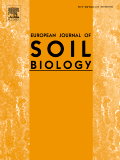
EUROPEAN JOURNAL OF SOIL BIOLOGY
Elevating Soil Science to New HeightsThe EUROPEAN JOURNAL OF SOIL BIOLOGY is a leading publication through ELSEVIER FRANCE-EDITIONS SCIENTIFIQUES MEDICALES ELSEVIER, renowned for its rigorous contribution to the fields of soil science, microbiology, and insect science. Established in 1993 and continuing to thrive until 2024, this journal is recognized for its high academic standards, achieving a prestigious Q1 ranking across multiple disciplines including Insect Science, Microbiology, and Soil Science in 2023. With a Scopus rank placing it in the top tiers of relevant categories, the journal serves as a vital platform for disseminating groundbreaking research and advancements in soil biology. Although currently not an open access journal, it offers valuable insights to researchers, professionals, and students, enhancing understanding and fostering innovative solutions for global soil health challenges. The journal's ISSN is 1164-5563 and its E-ISSN is 1778-3615, offering a wealth of knowledge from an esteemed publisher situated in France.